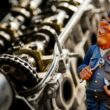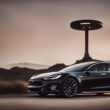Humans simply cannot accept that everything is constantly changing. Every change means learning new things. Having to learn new things. Changes challenge us, steal our comfort zones. Changes scare us. Just as back when the carriage lost its horses, the coach-driver became unemployed (where was the ancillary copyright right when you needed it?) and from then on the driver drove his vehicle himself. He became independent, he gained an unprecedented level of autonomy. An independence that opened our eyes and mind.
In the long history of mankind, the automobile can be regarded as a “very big game changer”. A development that didn't just have in mind what it is often used for today: To take it to the bakery. Cars have made us incredibly mobile. Where 30 km was once considered a “day's journey”, 30 km today is often not the easy distance we cover to get to work. People were afraid of this change. They were also afraid of the speeds that were now possible. The car is a temporary phenomenon. So spoke King Wilhelm of Prussia, the last German emperor. He was wrong. The car did not leave again. Not yet. But the "thing with the emperor" was done.

But with the history and the triumphal march of the automobile it became clear: The car has a weakness - and I do not mean the CO2 emissions, because we will master them. I mean the driver. Because people make mistakes. People get tired, are unfocused, simple: mistakes are human. That is why the car was continuously developed. ABS, ESP, airbag, lane keeping assistants - all just to compensate for human errors.
If you look around at automobile fairs, like now at the IAA in Frankfurt - then the next stage becomes clear. The car will become autonomous. And it will network. With the internet, with things, with people. It will be different. Like the shown “Concept IAA” from Mercedes-Benz.
And again “the people” are afraid of this change. Because we are facing as big a change as “then” - when the horse and the coachman became unemployed and we took our “autonomy” into our own motorized hands. Walking speed, running, running, 100, 200 km / h - all no longer a problem. The human controlled the pace. And now should he give up the responsibility, the control again? And fear comes out. The FAZ author Niklas Maak has in the FAZ written:
The price of autonomous driving is the driver's autonomy. The paradoxical attraction that made the car one of the most successful objects of modernity was that it promised freedom of departure and protection of privacy at the same time.
But nothing changes in our autonomy at all. Still, I'm learning: the car of the future will be as scary to people who fear progress as it is to newspaper readers using Google's search engine algorithm. The fact that in the future cars will no longer need arrogant drivers with a tendency to overconfidence in order to cope with the daily commute may deeply unsettle people who like to sort the gears themselves in the manual four-speed box of their Porsche 901. For road traffic in megacities, however, they will bring 100% more safety than drivers who are emotionally stressed by traffic jams and summer heat.

And there is no either-or. Or are there no carriages left?
Non-autonomous cars are parked in garages and if time and inclination fit, then you will get behind the wheel. You will start the engine with the ignition key, Google will not drive the car to your front door just because the time is right to commute to the office. We'll own "old cars" if we want to, have fun. To look back dreamily. To experience again what we, the motorists, have enjoyed so much for so many years. And on Monday morning we will prefer the autonomous car. It will once again massively change the mobility of the future.
Networking, as the CEOs of the major automotive companies say, will be the challenge for the next decades. Will Google and Apple sell the first autonomous cars? Or will the big players in industry forestall them? One thing is clear - we will get rid of the senseless “traffic jam”. Because that's what we humans do. We look for solutions. We are looking for ways. We demand progress with power.
And if there is a market for our car - or the networked personal assistant - to tell us: We're too fat, leave the butter out! (see the FAZ article), then we will implement it and in the end we will recognize - it is helpful.

The fear of the data collector
Cars will collect data for this purpose, as only banks and telephone companies used to do. Everything has long been privatized. Long out of control for you and me. We have movement data. What does it help us? The visions of the automobile manufacturers are different. These cars will also collect data. Inconceivably, however, the fear of the great romantics, for example, is the collection of banal data. Data you can control. Data that we may even be happy to disclose in a convenient way. Pulse? Determined from the driver's seat, in case of doubt directly to the control center, in order to send the blood pressure reducer home by “same day delivery”. What's bad about that? We order pizza via app. We use the keyboard to ask a stranger about the weather, about the stock market prices. The neighbor? We've only talked to him on Facebook for a long time.
The educational citizen's feature section is full of romantic resentment. It sounds like the quaint truth. The sense of our automobile. We have to drive it. We have to control it. Fear of losing control. And people notice how Niklas Maak or Guido Bellberg not how they slowly think and act in an ultra-conservative and protectionist way. Would Niklas and Guido also have preferred the horse and its stable? You would never have discovered the joy of shifting gears, the fun of G-forces, the lustful search for the ideal line. They would have insisted it can only be the horse that brings us to work. Or into the distance. And of course in the future.
They would have been guided by their own fear - the fear of change. And would have missed the great fun just because their own frame of reference was too tight!
[=” ” ]All photos: SB media, Stefan Baldauf!




